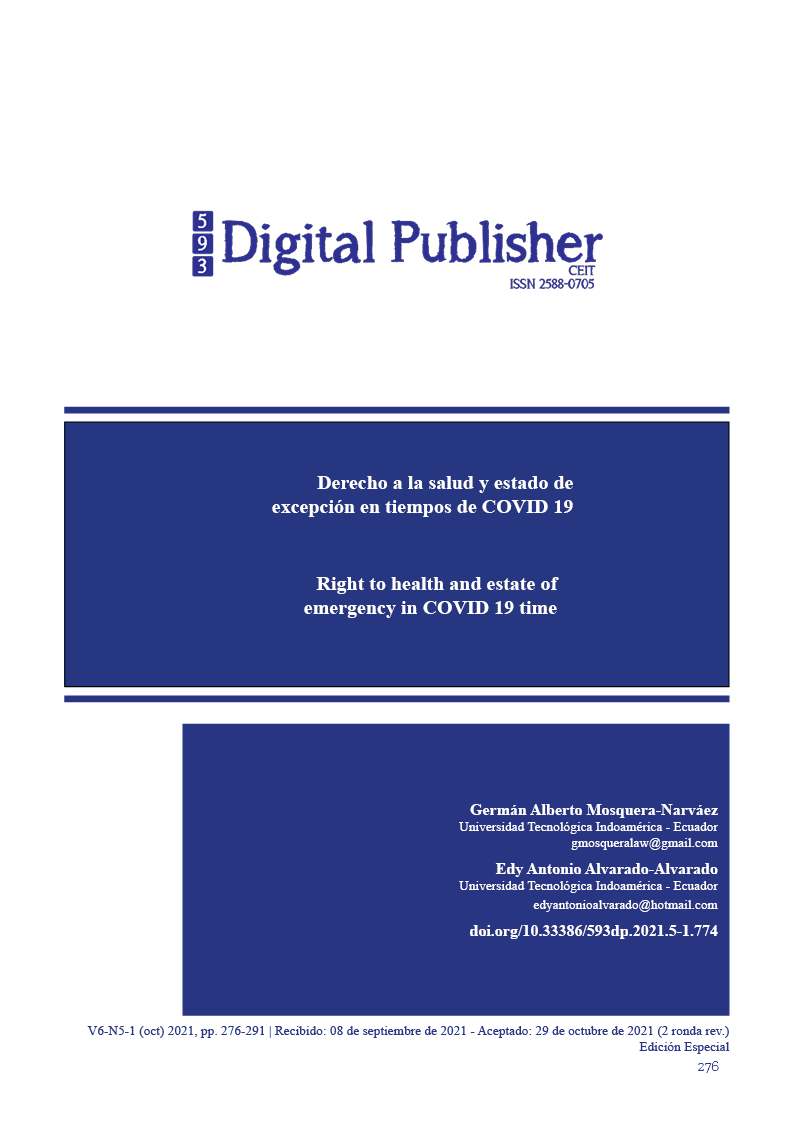Right to health and estate of emergency in COVID 19 time
Main Article Content
Abstract
This research describes the dogmatic contributions that have arisen for the protection of rights to the health in the context of COVID-19 emergency. In addition, the research analyses those constitutional legal parameters, prerogatives and limitations related with the State actions regarding to the health emergency. In this sense, it describes the needs for State actions to guarantee the exercise of constitutional rights, focusing the analysis on the right to health. This framework is compared with the extreme vision of declare the exception status, which could turn into an abuse of power and violation of rights by the State, contrary to what is sought. Judgment No. 1-20-EE / 20 of the Ecuadorian Constitutional Court is studied, which offers constitutional viability to address the COVID-19 emergency, through the declaration of a “exception status” in the Ecuadorian territory. In that sense, the research answers the following questions: Was the new and unexpected pandemic situation, that the country experienced, susceptible to attention through the ordinary mechanisms of institutional management? or was it attended with the declaration of the exception status? Was it complying or not with the constitutional provisions and the doctrine's recommendations?
Downloads
Article Details

This work is licensed under a Creative Commons Attribution-NonCommercial-ShareAlike 4.0 International License.
1. Derechos de autor
Las obras que se publican en 593 Digital Publisher CEIT están sujetas a los siguientes términos:
1.1. 593 Digital Publisher CEIT, conserva los derechos patrimoniales (copyright) de las obras publicadas, favorece y permite la reutilización de las mismas bajo la licencia Licencia Creative Commons 4.0 de Reconocimiento-NoComercial-CompartirIgual 4.0, por lo cual se pueden copiar, usar, difundir, transmitir y exponer públicamente, siempre que:
1.1.a. Se cite la autoría y fuente original de su publicación (revista, editorial, URL).
1.1.b. No se usen para fines comerciales u onerosos.
1.1.c. Se mencione la existencia y especificaciones de esta licencia de uso.
References
Arbelaz Rudas, M. (2006). Derecho a la salud en Colombia. Bogotá: Antropos.
Asamblea Constituyente. (2008). Constitución del Ecuador. Quito: Registro Oficial 449 de 20-oct.-2008.
Asamblea Nacional del Ecuador. (2009). Ley de Seguridad Pública del Estado. Quito: Registro Oficial 35 del 28 de septiembre del 2009.
Avila Santamaria, R. (2012). El derecho a la salud en el contexto del buen vivir. Obtenido de UASB DIGITAL: https://repositorio.uasb.edu.ec/bitstream/10644/2985/1/%c3%81vila%2c% 20R-CON-006-El%20derecho.pdf
Bobbio, N. (1987). La teoria de las formas de gobierno en la historia del pensamiento politico . México DF: FCE.
Castillo Cordova, L. (2008). Principio de proporcionalidad y habeas corpus. Obtenido de http://perso.unifr.ch: http://perso.unifr.ch/derechopenal/assets/files/anuario/an_2008_02.pdf
Castillo Cordova, L. (2018). Los derechos fundamentales no se suspenden ni se restringen en un régimen de excepción. Pirhua.
Conferencia Internacional sobre Atención Primaria de Salud. (1978). DECLARACION DE ALMA-ATA. Obtenido de Conferencia Internacional sobre Atención Primaria de Salud: https://www.paho.org/hq/dmdocuments/2012/Alma-Ata- 1978Declaracion.pdf
Congreso Nacional. (2001). Ley de Seguridad Social. Quito: Registro Oficial Suplemento 465 de 30-nov-2001. Ultima modificación: 31-mar-2011. Obtenido de Congreso Nacional.
Dìaz Ricardo, T. (2010). Aspectos internacionales del derecho a la salud. Saber, Ciencia y Libertad.
Franco Trujillo, C. (2016). “El Presidente de la República Tendrá la Posibilidad de Delegar Funciones En Los Estados de Excepción. Loja: Universidad Nacional de Loja.
Leary, V. (1993). Implications of a Right to Health”, en Human Rights in the Twenty-First Century. A Global Challenge. New York: Martinus Nijhoff Publishers.
Leenen, H. (1991). The Right to Health Care and its realisation in The Netherlands.
Amsterdam: A. Den Exter & H. Hermans, Kluwer Law International.
Lopera Mesa, G. (2018). Principio de proporcionalidad y control constitucional de las leyes penales. Quito: Ministro de Justicia y Derechos Humanos.
Malo-Serrano, M., & Malo-Corral, N. (2018). Reforma de salud en Ecuador: nunca más el derecho a la salud como un privilegio. Revista Peruana de Medicina Experimental y Salud Pública.
Melendez, F. (2017). Los Derechos Fundamentales en los Estados de Excepción según el Derecho Internacional de los Derechos Humanos. Madrid: Universidad Complutense de Madrid.
Melo Delgado, R. (2015). El estado de excepción en el actual constitucionalismo andino. Quito: Corporación Editora Nacional.
Mideros Morales, R. (2012). Transformar la salud para caminar hacia el Buen Vivir. Quito: UASB.
Naciones Unidas. (1948). ONU. Obtenido de Declaración Universal de Derechos Humanos: https://www.un.org/es/universal- declaration-human-rights/
Naciones Unidas. (1968). ONU. Obtenido de pacto derechos economicos, sociales,culturales, civiles politicos: http://www.pichincha.gob.ec/phocadownload/LOTAIP_Anexos/Lit_A/lit_a2/24_pacto_de_derechos_economicos_sociales_culturales_civiles_politic os.pdf
Oyarte Martinez, R. (2015). Derecho Constitucional Ecuatoriano y Comparado. Quito: Corporación de Estudios y Publicaciones.
Oyarte, R. (2001). El Amparo ante la Jurisprudencia y el Derecho Positivo. Quito: Ed CLD.
Prieto Sanchíz, L. (1991). Los limites a los derechos fundamentales. Madrid: Universidad de Navarra.
Revenga, M. (2017). Legalizando el Estado de excepción en Estados Unidos. RdL. Solá, J. (2006). Control Judicial de Constitucionalidad. Buenos Aires: Abeledo Perrot.
Tortora , H. (2017). Las limitaciones de los derechos fundamentales. Barcelona: Lex.
Vargas Carrera, D. (2016). Sindicatos Por Rama de Actividad: La Pertinencia de Laimplementación de Esta Figura En El Ecuador. Análisis Del sector Empresarial y Legislación Comparada. Quito: PUCE.
Villalón , P. (2018). Estudios sobre las situaciones de emergencia. Madrid: Trotta.



